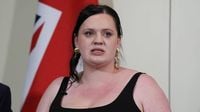Two prominent survivors of grooming gang abuse have resigned from the national inquiry’s victims and survivors liaison panel, casting a sharp spotlight on the government’s handling of one of the most sensitive and controversial investigations in recent British history. Fiona Goddard and Ellie-Ann Reynolds announced their resignations on Monday, October 20, 2025, both expressing profound disillusionment with the inquiry’s direction and the treatment of survivors at its heart.
The resignations come just months after Prime Minister Sir Keir Starmer ordered the national inquiry into grooming gangs across England and Wales, following years of mounting pressure from campaigners and a damning audit by Baroness Casey. The inquiry was intended to address the systemic failures by statutory services in protecting children from sexual exploitation, but the process has now become mired in allegations of secrecy, conflicts of interest, and attempts to dilute its focus.
In her resignation letter, Ellie-Ann Reynolds did not mince words, declaring, “The inquiry had become less about the truth and more about a cover-up.” She went further in a BBC Radio 4 interview, saying, “If they were that serious in appointing a chair that was actually going to succeed in this inquiry they would not have picked a police officer or a social worker. It should have been a judge – it should have been somebody that was completely impartial and non-biased.” Reynolds, who was among underage children raped by a gang of Pakistani brothers in Barrow, accused the panel process of being “scripted” and said survivors were limited to submitting just two questions for potential chairs, with no opportunity to confer with each other. “We were gaslit to believe we were helping when, in reality, we were just being controlled and silenced again,” she added, as reported by BBC News.
Fiona Goddard, a survivor of abuse in a Bradford children’s home, echoed these sentiments. In her letter to the Home Office, she wrote, “The dynamics of this inquiry, including potential chairs and progress, should have been conducted openly and honestly by the Government, and survivors should have had the choice to voice their opinions if they decided to. Instead, the secretive conduct and conditions imposed on survivors has led to a toxic, fearful environment, and there is a high risk of people feeling silenced all over again.” Goddard accused officials of using “condescending and controlling language” and shutting survivors out of key discussions, particularly about the appointment of the inquiry’s independent chair.
Both Goddard and Reynolds raised concerns about the two shortlisted candidates for chair – former deputy chief constable Jim Gamble and social worker Anne Hudson – arguing their backgrounds in policing and social services represented a “disturbing conflict of interest.” Goddard was blunt: “Having a police officer or social worker leading the inquiry would once again be letting services mark their own homework.” Survivors, they insisted, had repeatedly called for a judge to lead the process to guarantee impartiality and restore faith in the inquiry.
The issue of the inquiry’s scope has also become a flashpoint. Goddard and Reynolds both criticized what they saw as attempts to expand the investigation beyond grooming gangs into the broader territory of child sexual abuse and exploitation. Goddard warned, “Expanding the scope of this inquiry risks it being watered down and once again, failing to get to the truth.” Reynolds was even more explicit, stating in her resignation letter, “The final turning point for me was the push to change the remit, to widen it in ways that downplay the racial and religious motivations behind our abuse. For many of us, these were not incidental factors; they were central to why we were targeted and why institutions failed to act. To erase that truth is to rewrite history.” According to the Daily Mail, Reynolds further argued, “In my opinion, I think that this panel is aiming to prevent the truth from coming out about the fact that we do have grooming gangs in the country that are predominantly Asian, Pakistani men.”
Government officials have strongly denied any attempt to dilute the inquiry’s focus or stage a cover-up. Safeguarding Minister Jess Phillips insisted, “We are committed to exposing the failures to tackle these appalling crimes and keeping the survivor perspective central.” In a letter to MPs on the Home Affairs Committee, Phillips defended the length of the chair selection process, stating, “It has been alleged that the time it is taking and the process being followed to appoint a chair is an indication of the government seeking to ‘cover up’, or failing to prioritise, the issue. This could not be further from the truth.” She emphasized that the government was following a “standard process” and that a chair would be confirmed “very shortly.”
Other ministers echoed these reassurances. Justice Minister Sarah Sackman told ITV, “The grooming gangs scandal and the abuse that was suffered by victims is one of the worst crimes in recent British history. The Government has acted in ordering a national inquiry. We’re taking our time to choose the best possible chair to ensure that our response is robust.” Cabinet Minister Peter Kyle added, “Victims and survivors are at the forefront of our minds.” The Prime Minister’s spokesman maintained, “We will get the right chair. Victims and survivors are at the heart of this process. We are working flat out to get the make-up and structure of the inquiry right.”
Yet, the controversy has not abated. Shadow Justice Secretary Robert Jenrick, speaking to BBC Breakfast, described the resignations as casting “a real shadow over the government’s efforts to create this national grooming gang inquiry.” He called the victims’ letters “very powerful indeed” and criticized the government for “excluding survivors from meaningful participation and changing the inquiry’s scope so that it doesn’t really focus on the heart of the matter, which is grooming gangs, rape gangs, group-based activity.” Jenrick urged the government to “take action now and grip this because it is one of the worst scandals in our nation’s modern history and the victims are being badly let down.” He also acknowledged that failures to address child sexual abuse had spanned political parties, stating, “I think politicians of all stripes did not do enough on this issue. Everyone should have done more.”
The broader context is sobering. Goddard’s personal history, as detailed by the Daily Mail, is harrowing: raped and abused by at least 50 men from the age of 14, trafficked across multiple cities, and repeatedly failed by police and social services who blamed her for her own victimization. She waived her right to anonymity to challenge the stigma and expose the truth. Reynolds, too, has spoken publicly about her ordeal and the failure of institutions to protect her and other children.
With the inquiry chair still unappointed as of October 21, 2025, and survivors’ trust in the process at a low ebb, the fate of the national grooming gang inquiry hangs in the balance. The government faces mounting pressure to deliver not only justice, but transparency and genuine survivor involvement – or risk repeating the very mistakes the inquiry was meant to address.



